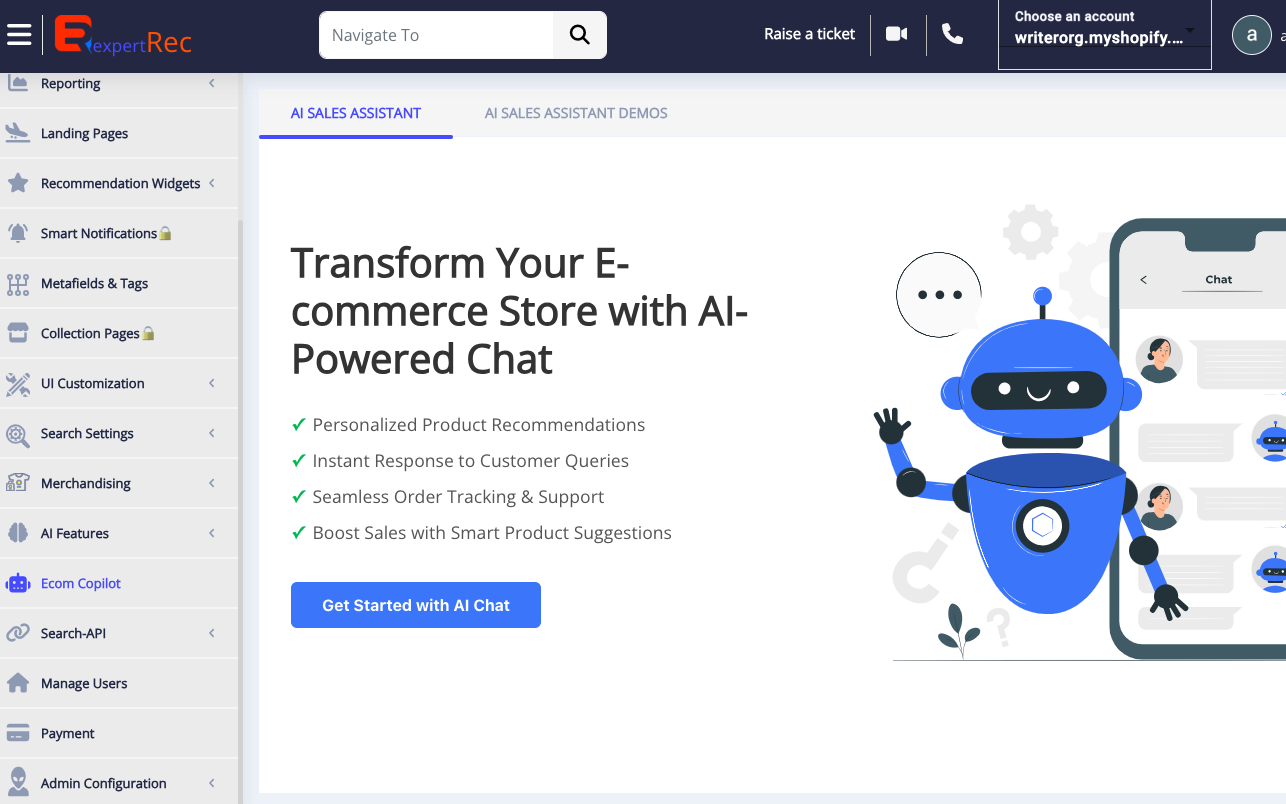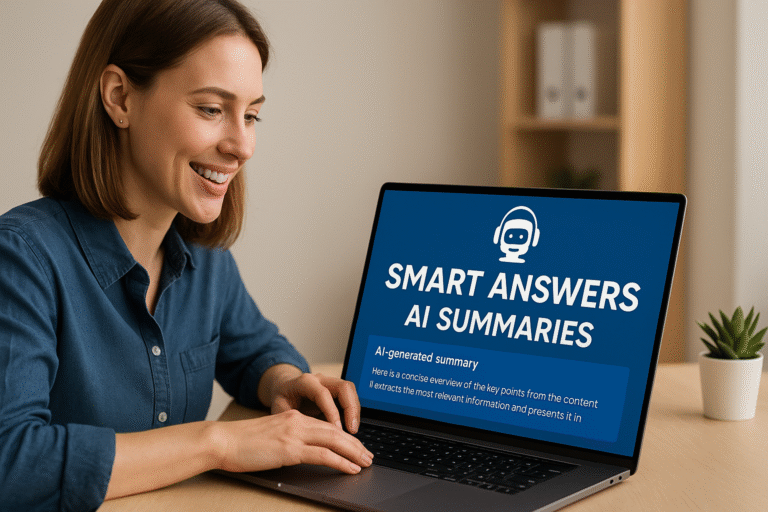In an age where users demand instant, accurate, and relevant answers, conventional search models are struggling to keep up. Whether navigating a product catalog, a help center, or a documentation-heavy site, users don’t just want links—they want direct answers. This is where smart answers and AI summaries are redefining the way people interact with digital content.
By combining natural language processing (NLP), semantic search, and context-aware summarization models, AI can now generate concise answers from long-form content and display them in real time. These smart systems save users from digging through multiple pages and significantly enhance the search experience, leading to increased satisfaction and faster decision-making.
In this blog, we’ll explore how smart answers and AI summaries work, whether they’re worth implementing, potential alternatives, and how Expertrec enables businesses to integrate this powerful functionality into their websites.
What Are Smart Answers and AI Summaries?
Smart answers refer to AI-generated responses to user queries that directly answer a question, often in a summarized or context-aware format. Instead of presenting users with a list of documents, these systems retrieve and synthesize the most relevant part of the content.
AI summaries, on the other hand, focus on distilling longer blocks of information – like articles, manuals, FAQs, or product pages into short, easy-to-understand formats. They may be extractive (picking key sentences) or abstractive (rephrasing and condensing content like a human would).
These technologies are commonly used in:
-
Customer support portals
-
Knowledge bases and documentation sites
-
Product catalogs and ecommerce search
-
Internal enterprise search systems

How Do They Work?
At a high level, smart answer and summarization systems leverage a combination of:
1. Natural Language Understanding (NLU)
NLU enables AI to parse user queries for intent and context. This allows systems to go beyond keyword matching and understand what the user is really asking.
2. Information Retrieval (IR)
Once the system understands the query, it retrieves relevant documents using semantic search or dense vector embeddings.
3. Text Summarization Models
Using pretrained language models (such as transformers), the system then either extracts the most relevant parts of the content (extractive) or generates a new summary (abstractive) tailored to the query.
4. Answer Ranking and Presentation
AI models rank possible answers and display the most relevant summary, often at the top of the search results—this is sometimes referred to as a “smart snippet” or “featured result.”
Benefits of Smart Answers and AI Summaries
Implementing AI summaries and smart answers offers several key benefits for both users and site owners:
-
Faster Information Access: Users get instant, direct responses, reducing time spent on navigation.
-
Enhanced UX: Improves overall customer experience by reducing friction during discovery or support interactions.
-
Lower Support Costs: Automated summaries can handle repetitive support queries, reducing human workload.
-
Improved SEO and Engagement: Featured answers and structured snippets keep users engaged and on the site longer.
-
Contextual Product Discovery: In ecommerce, users can get summary-based responses about product specs, comparisons, or FAQs, improving conversion rates.
Is It Worth Using AI Summaries and Smart Answers?
Absolutely, but with considerations.
Use Cases Where It’s a Clear Win:
-
Knowledge-heavy sites like SaaS platforms, product documentation, or enterprise portals.
-
Ecommerce sites with complex product categories or technical specifications.
-
Customer support systems where users ask repetitive or complex questions.
Potential Limitations:
-
Content Quality Dependence: Poorly structured or sparse content leads to weak summaries.
-
Model Limitations: Even state-of-the-art LLMs can hallucinate or generate incorrect responses if not properly fine-tuned.
-
Cost and Infrastructure: Running real-time LLMs and vector databases can require substantial backend support.
Despite these challenges, the benefits usually outweigh the limitations, especially when using a managed or semi-automated platform that minimizes technical overhead.
Are There Better Alternatives?
While AI summaries and smart answers are powerful, there are alternative approaches—each with trade-offs.
1. Traditional Keyword Search
Still widely used, but limited to exact matches. Lacks contextual understanding and doesn’t summarize content.
2. Manually Curated FAQs or Support Articles
Offers control and accuracy but doesn’t scale well and can’t personalize responses.
3. Decision Trees or Rule-Based Chatbots
Simple to deploy but often rigid and frustrating for users who deviate from expected inputs.
4. Basic Autocomplete Search Engines
Help with search input but don’t deliver actual answers or summaries.
These methods can complement smart answer systems, but on their own, they are often outdated or insufficient for today’s user expectations.
How Expertrec Delivers Smart Answers and AI Summaries
Expertrec simplifies the integration of AI-powered smart answers and summaries into your ecommerce store, documentation hub, or customer support portal.
Key Features of Expertrec’s AI Summary & Smart Answer Engine:
-
Contextual Smart Snippets
Expertrec uses AI to surface direct answers at the top of search results, derived from your content pages, help center, or product catalogs. -
Abstractive & Extractive Summaries
It supports both summary types, ensuring the most relevant response is generated based on query complexity and content source. -
Semantic Search Foundation
Built on advanced NLP and vector-based search models, Expertrec understands query intent and retrieves content with semantic relevance not just keyword matches. -
Real-Time Answer Generation
Expertrec generates and displays smart answers dynamically as new queries and content come in, ensuring always up-to-date responses. -
Multilingual Support
Expertrec’s engine works across languages, making it ideal for global ecommerce or international help portals. -
Low-Code Implementation
With no-code and low-code integration options, businesses can activate AI summaries and smart answers without needing a dedicated ML team. -
Scalability and Affordability
Unlike custom LLM deployments or enterprise-only solutions, Expertrec offers affordable, high-performance AI tailored to small and medium businesses.
Final Thoughts
Smart answers and AI summaries are not just trending buzzwords they are transformational tools that elevate digital search experiences across ecommerce, support, and content-heavy platforms. They provide users with instant, relevant answers while reducing cognitive load and improving conversion paths.
While deploying such capabilities independently can be technically demanding, Expertrec bridges the gap by offering plug-and-play solutions with deep AI intelligence built-in. Whether you’re a growing ecommerce business or a SaaS platform looking to improve self-service, Expertrec’s smart answer and summarization engine provides a future-ready solution that delivers real business impact.
FAQs on Smart Answers and AI Summaries
Smart answers are direct responses to specific queries, while AI summaries condense longer texts into short, digestible content relevant to the context.
2. Can Expertrec generate summaries from my existing content?
Yes, Expertrec can index your content and generate real-time summaries and smart answers without manual tagging or data restructuring.
3. Is coding required to integrate smart answers into my website?
No, Expertrec offers low-code or no-code integration, allowing you to add AI-powered summaries with minimal technical effort.
4. Are smart answers suitable for ecommerce sites?
Yes, ecommerce platforms benefit greatly from smart answers—users can get instant specs, comparisons, and FAQs directly in search.
5. Does Expertrec support multilingual smart answers?
Yes, Expertrec’s AI engine can understand and respond to queries in multiple languages, ideal for international businesses.
6. How accurate are the AI-generated answers and summaries?
Expertrec leverages fine-tuned AI models that are optimized for enterprise use cases, ensuring high-quality, context-aware responses. However, results also depend on the quality of the source content.




